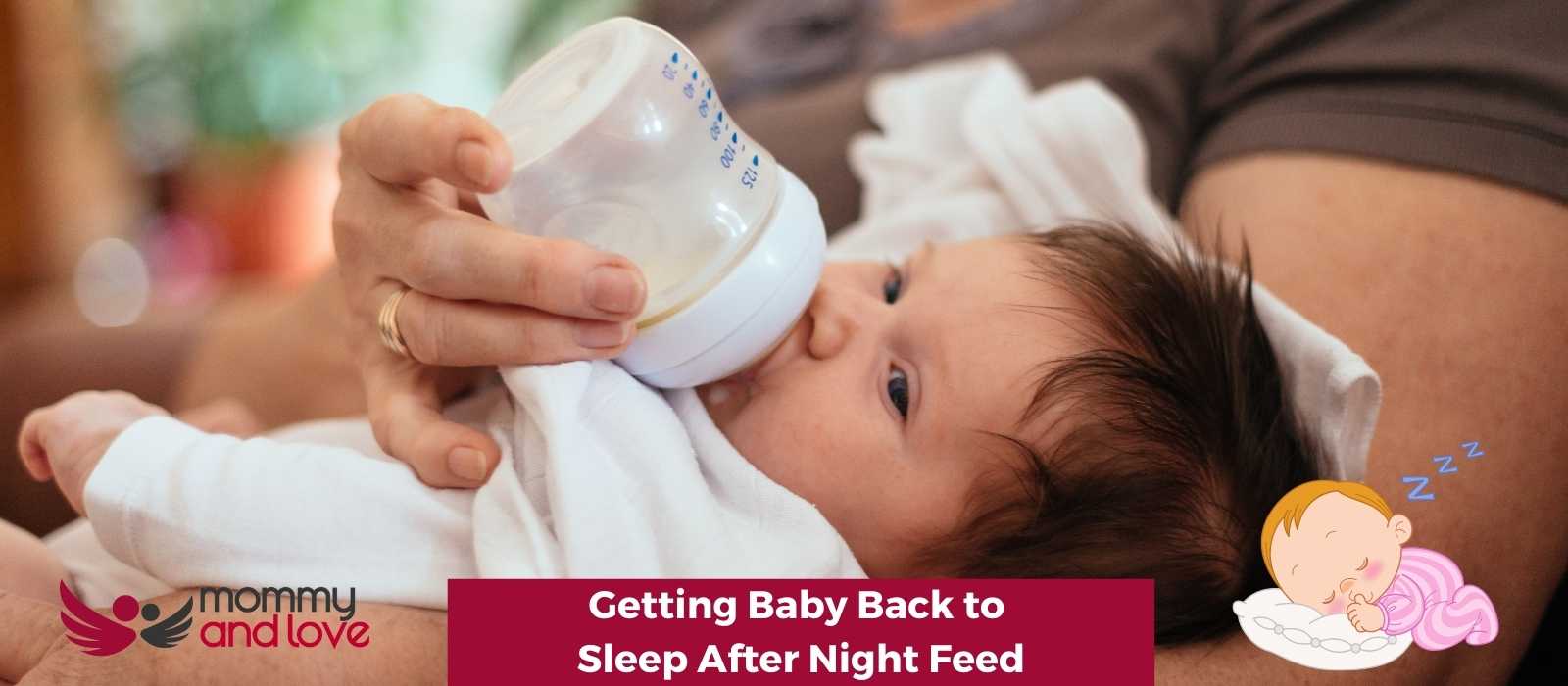If you’re a parent, chances are you know the drill. You put your baby to bed, and after a few hours he or she wakes up hungry. So you feed them, and then they go back to sleep but only for an hour or two before waking up again. This can be a frustrating cycle that leaves both parents exhausted.
In some instances, your baby will fall back to sleep after her usual night feed. And that’s great. Having a few tricks up your sleeves such as keeping all the lights off during the feeding session, changing diapers before the feeding, avoiding noise and many more can be helpful for when she stays awake.
Affiliate Disclaimer: As an Affiliate, we earn from qualifying purchases.
How to Make Babies Sleep After Feeding?
Getting your baby to sleep after you nurse her can be challenging but it doesn’t have to be. One option is to try dream feeding, so feeding your baby without waking them.
Here are a few ways to help you get your little one back to her sleep:
Gently Rubbing Your Baby’s Back After Feeding.

When a baby is fussy or restless after feeding, one way to help her calm down and fall back asleep is to gently rub her neck while you gently rock her.
This action can help release tension in the neck and upper back muscles, which can lead to a more relaxed state. Additionally, the rhythmic motion of rubbing can be soothing to a baby and promote relaxation. If your worried about rocking becoming a habit, we’ve done a super guide to When To Stop Rocking Baby To Sleep.
Rocking bassinets are a great help for younger babies. They can help a baby drift off back to sleep, so it might be worth investing in the Best Rocking Bassinets to help your baby.
Give Your Baby a Pacifier When Needed.
Pacifiers can be a great way to help babies fall asleep and stay asleep in their crib during their sleep and naps. They’re soothing, and the act of sucking can help babies relax. If you’re using a pacifier to help your baby sleep, make sure to keep it clean and free of bacteria. Yes, Babies Can Sleep With Pacifier
Also, be sure to avoid giving your baby a pacifier when she’s just learning how to breastfeed because it could get in the way of your baby’s ability to latch on and breastfeed. Read our guide to nipple confusion.
Keep the Lights Low and Avoid Loud Noises During Night Feedings.
Young children can benefit from a dark and quiet environment when trying to sleep. Keeping the lights low and avoiding loud noises can help them relax and drift off to dreamland, especially when you breastfeed or bottle-feed at night.
This peaceful sleep environment can be created by using blackout curtains, turning off electronics, and speaking in hushed tones while in your baby’s room. It will help your baby settle back after feeding. And if you ever need to use a light during your feeding sessions, consider getting a night light.
Creating a restful atmosphere in your baby’s room will help them settle back to sleep more quickly after each night’s feedings. It will also help you catch some sleep.
Give the Baby Time to Fall Asleep on Their Own.
Allow her to try to sleep on her own. If your baby wakes up or starts crying a few minutes after falling asleep, wait for a few moments before entering her room.
Do not turn on the lights while you pick her up, or play with her if she’s wide awake until she’s tired enough to go back to sleep in her crib. You might gently touch her tummy while singing a lullaby to soothe her.
Avoid Getting Your Baby Overtired.
Overtired babies have difficulty falling asleep, have irregular sleeping patterns, and wake up more frequently throughout the night.
Additionally, when a baby is overtired, she is more likely to become fussy and has difficulty falling back asleep when she wakes up in the middle of the night. This can often lead to a vicious cycle of poor sleep for both the baby and the parents. How To Help An Overtired Baby Catch Up On Sleep
There are several signs that can help you determine if your baby is overtired. These include increased fussiness, difficulty settling down, and rubbing her eyes. If you notice any of these signs, it’s important to try to get your baby to take a nap or put her on an early bedtime.
Adjust your baby’s naptime and sleep time schedule accordingly such as when you’re baby is waking early to prevent overtiredness.
Change Your Baby’s Diapers Before Your Nightly Feeds.

Changing your baby’s diapers before each night feeding will help you avoid having to wake her up again for a diaper change.
Some parents even leave the diaper on until the next feeding.
However, you might need to change diapers after your night feeds especially if your baby’s digestive system is still adjusting. When changing your baby’s diapers, be sure to make them as low-key as possible.
Consider Swaddling Your Baby to Help Her Fall Back to Sleep.
Swaddling is a technique used to wrap a baby tightly in a cloth. It makes babies feel secure and calm, which can help them fall back asleep faster at night or during their usual nap. It also helps keep babies from waking up due to the startle reflex.
Use a White Noise Machine.
The noise from this machine helps to block out any other sounds that might be keeping the baby awake, such as traffic or other noises in the house. It can also help to soothe the baby and create a calming environment for sleep.
Other useful tools include putting some soothing music or sleepy audiobooks on that can be relaxing when young children hear them.
Establish a Consistent Bedtime Routine.

Having a consistent bedtime routine can help your baby sleep better at night and fall back asleep more easily after each feeding at night.
This also helps her develop positive sleep associations and better sleep patterns.
If you keep at it while your baby grows, you can start seeing your little one start sleeping better at night.
Conclusion on How to Get Baby to Sleep After Night Feedings
Nightly feedings are a necessary part of raising a baby, but they can also be challenging. We hope that the tips we’ve shared will make a huge difference and help you get your little one back to sleep quickly and easily after a nighttime feeding.
Remember every baby is different, so you may have to try more than one of our tips to make it work for you and your baby. And don’t forget to jump back into bed as soon as your baby falls asleep!
If you’re still having trouble getting your baby back to sleep after feeding her at night, consider talking to a healthcare professional for advice and up-to-date information.
FAQs on Helping Your Baby Sleep After Night Feeds
How Many Times a Baby Should Wake Up at Night?
Most infants wake up twice or three times during the night for feedings. This is normal and happens because they have short sleep cycles. By 3 months, many young children have settled into a routine of longer durations awake during the day and longer sleep times at night.
As your child grows and develops, you can expect her to start to sleep without the need for feedings. This is a sign that she is growing and getting more restful sleep.
How Long Do Babies Keep Waking Up at Night?
Most babies do not begin sleeping through the night for 6 to 8 hours without waking until they are about 3 months old or weigh 12 to 13 pounds. This is due to the fact that they are still growing and need sustenance during the night. And as soon as they start to eat solid foods at 6 months, these night wakings will become less frequent. So while it may be frustrating for parents, it is a natural process that infants go through.
Why Do Babies Need a Night Feed?
Infants need night feeding for a variety of reasons in their first few weeks and months. In the early weeks, breastfeeding at night is essential for establishing and maintaining enough milk supply, and infants often require more milk than they can get during the day. If you feed at night, be it breastfeeding or bottle-feeding, also helps ensure that your child is getting enough sleep, which is crucial for their development.
Many parents worry that night feeds will disrupt their own and their baby’s sleep schedule, but there are ways to minimize this. Remember that night feeds are temporary and your baby will soon be sleeping through the night.

This article was written by: Gian MIller – Full-Time Writer, Baby Whisperer & Dad of 3.
Gian spends a lot of his time writing. A self-proclaimed baby whisperer, Gian has been through it all with his own children and is passionate about sharing his hard-won wisdom with other parents. When he’s not writing or changing diapers, you can find him playing the guitar or watching baseball (or preferably both at the same time).






